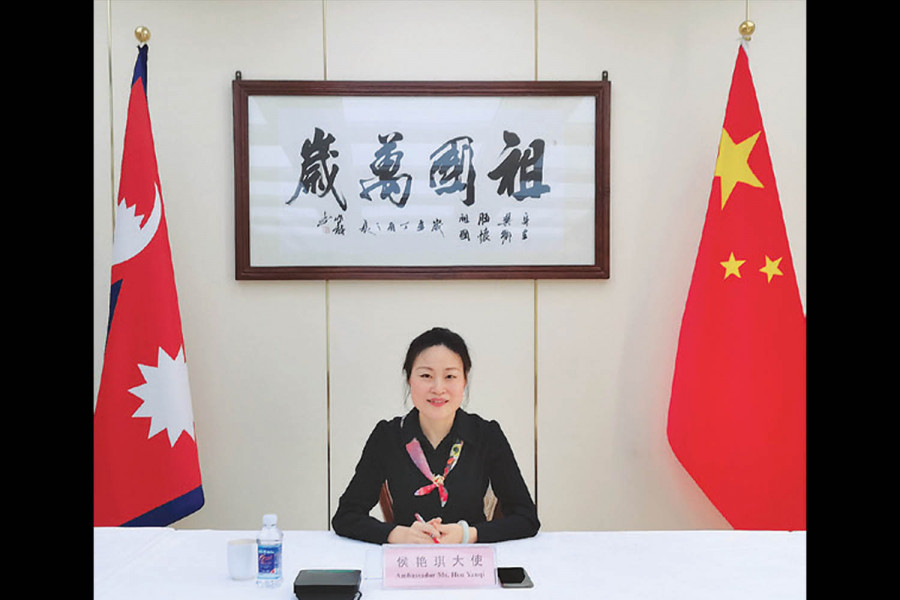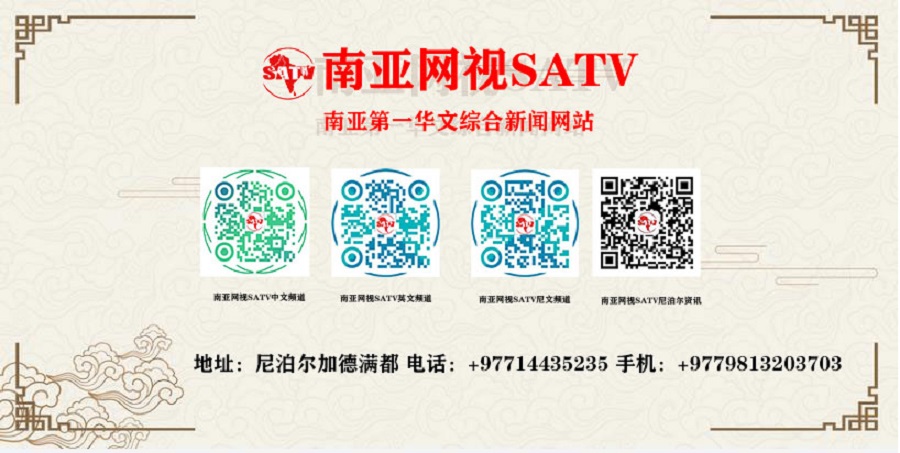
The Chinese were known as reticent, especially when it came to Nepal matters. They barely spoke of their southern neighbour. But they are talking now—from Beijing and Kathmandu—on a wide range of issues including politics as well as what kind of development support Nepal should seek and accept, and from whom.
On Thursday, Chinese Ambassador Hou Yanqi spoke on a wide range of issues in a press conference, usually a rarity by the Chinese.
From railway to the Belt and Road Initiative, from China’s stabilising role in the world to Beijing’s “three supports” to Nepal and from the country’s vaccination support to efforts to safeguard peace in Asia, Hou touched upon a host of issues surrounding Nepal and the world.
After reading out a nine-page “media briefing”, Hou responded to media queries during the virtual press conference.
On the cross-border railway, which has captured Nepalis’ imagination, Hou said the construction of the project is very complex due to geological conditions; and until both Nepal and China agree on its technical standards and funding sources.
She said the project will come across many complexities due to geological conditions, frequent natural disasters and high construction costs.
“As a diplomat, I cannot say when and how the project is constructed because it’s a technical issue. Experts have told me the feasibility study alone will take five-six years given that it goes smoothly,” she said. “However, there is a determination from the Chinese government for the project and I believe it is not a dream but will be a reality.”
Her statement on the cross-border railway comes a month after Nepal and China signed an agreement for the feasibility of the project.
During virtual talks between Nepali and Chinese railway authorities in January, the Chinese side said that it is all set to fund the feasibility study of the Kerung-Kathmandu railway and made clear that it will take another 42 months to complete the study of the project. After completing the feasibility study, both sides will prepare the detailed project report that will clearly give the picture about the technical details, construction cost and its possible return.
Technical assistance for the China-aided feasibility study of the cross-border railway was one of the six agreements the two neighbouring countries reached during the visit of Wang Yi, Chinese foreign minister and state councilor in the last week of March.
This, however, is not the first time the Chinese ambassador has pointed at myriad challenges in building the cross-border railway.
In her interview with the Global Times on April 14, she said that the cross-border railway construction is full of complexities and very costly which is about $31 millon (around 200 million yuan) per kilometer.
Earlier in May 2019, while speaking with the Nepali media, she had made a similar statement, saying: “This is not a kind of project that can be completed in a few years.”
In her Thursday’s presser, Beijing’s envoy to Kathmandu also expressed her discontent, albeit obliquely, at the current Cabinet’s move to scrap the decision of the erstwhile KP Sharma Oli government to sign a memorandum of understanding with China Gezhouba Group Corporation to develop the Budhigandaki Hydropower Project.
The Oli administration in September 2018 had decided to rope in the Chinese developer for the multipurpose project.
“Government changes are natural in democratic countries and it is their internal matter. However, a change in policies with the change in the government is a cause for concern,” said Hou.
“This affects the investors mainly in large projects. Construction of hydropower projects or other industries takes time where the investors make long-term planning and investment. However, a frequent change in policies affects them.”
The Chinese envoy also pointed out problems in land acquisition and felling trees and plants for project development. “We expect the Nepal government to address these problems,” she said.
Regarding buying power from Nepal—Nepal is exploring options to sell its surplus electricity in the near future—Hou did not sound optimistic.
She said that the construction of cross-border transmission lines between the two countries, a must to export energy, is difficult and “very costly”.
“While the surplus energy can be exported, it would be better to use it for internal consumption by setting up industries and modernising agriculture,” she said. “This will help Nepal to strengthen its economy.”
Hou took the press meet as an opportunity to defend the Chinese restrictions at border points. Movements of cargo trucks through Nepal-China border points have been restricted for over two years now.
She expressed concerns over talks in Nepal about a “soft blockade” by China. She said it was wrong to call it a blockade when there are some difficulties in movements of cargo trucks because of the pandemic. That the China-Nepal trade jumped by 67 percent last year proves that the “soft blockade” claim is baseless, she said.
Citing the Chinese side’s statistics, she said the volume of trade between the two countries reached $1.977 billion last year, of which Nepal’s export to China increased 63 percent.
“The data prove that the so-called soft blockade is baseless,” she said.
“The Chinese side has made continuous efforts to improve the capacity of one-way cargo transportation at border points while the authorities from both the countries are in communication to further smoothen it,” she added. “There is a mechanism comprising officials from both sides to discuss the border-related affairs.”
Though she claimed that Nepal’s export had increased, Nepal government’s reports show otherwise. Exports to China have decreased for the last two fiscal years as the northern bordering nation has not facilitated exports from Nepal. As per traders, China has been preventing exports.
“For more than two years, China has been preventing Nepali products from entering the country on the pretext of Covid-19,” Dinesh Shrestha, vice-president of the Federation of Nepalese Chambers of Commerce and Industry, told the Post on April 1.
After the 2015 earthquakes, when Khasa suffered much damage, China began promoting the Kerung route further west for cross-border trade. Opened in December 2014, the Rasuwagadhi-Kerung border crossing was upgraded to an international border point in August 2017, allowing citizens from countries besides Nepal and China to travel across the border.
But a few months later, China started to restrict cargo movement through Kerung too. Before 2014, lack of infrastructure had been a major hurdle for trade between the two countries.
Nepali traders accused China of imposing an "undeclared trade blockade" as hundreds of merchandise-laden container trucks were not allowed to cross the border into Nepal for several months. Since then, cargo movement has been allowed under a quota system.
Hou, however, pointed out some shortcomings on the Nepali side.
“We hope the Nepali side could also improve the efficiency of loading and unloading, and further improve the conditions of customs clearance,” she said. “The Chinese side attaches great importance to the desire of the Nepali side to resume export to China through land ports.”
On the Belt and Road Initiative, Hou said it’s not a grant assistance. “It is not a grant assistance. It is based on cooperation and cooperative modality that includes grant and commercial cooperation,” she said.
Nepal signed up to the BRI in May 2017.
During Wang’s visit, despite China’s keenness, Nepal did not sign any agreements under the BRI and made it clear that it is rather interested in receiving grants or concessional loans.
Hou, however, said that the BRI cooperation between China and Nepal “has not got bogged down.”
“On the contrary, it has become a road of hope that bolsters resilience and boosts confidence,” she said. “I would like to point out that BRI has never been a geopolitical strategy, but a road of development.”
Hou’s press meet comes a day ahead of the scheduled visit of US lawmakers to Nepal on the heels of ratification of the Millennium Challenge Corporation Nepal Compact by Nepali Parliament.
In the lead up to the ratification, Beijing had at least on two occasions cautioned Nepal against the $500 million American grant, saying Nepal should pursue an independent foreign policy. Beijing has for long viewed the MCC grant as an American attempt to countervail the BRI. On the other hand, Americans too have in the past warned Nepal against the BRI.
Hou in the past, however, had said Beijing has no objection to the MCC compact.
The Chinese ambassador said on Thursday that during his visit to Kathmandu, Wang “clearly pointed out that China supports Nepal in blazing a development path suited to its national conditions; China supports Nepal in pursuing independent domestic and foreign policies, China supports Nepal in participating in the BRI to a greater extent.”
“The ‘Three Supports’ has sent a very positive signal, which is China’s friendly policy towards Nepal is for all Nepali people and political parties [SIC],” said Hou. “The policy has maintained continuity and stability and will never change no matter how the political situation changes in Nepal.”
The ambassador also laid stress on promoting Asian unity, saying that when Asia fares well, the whole world benefits.
“We should resolutely safeguard peace in Asia,” she said. “We should vigorously advance Asian cooperation.”
Stating that China has always been the main stabiliser and power source of world economic growth, the ambassador said that “any denigration, suppression or containment on China’s development is doomed to fail.”
Responding to a query regarding Nepali students, who returned from China after the pandemic, stuck in Nepal, Hou said the foreign ministries of the two countries are working on plans to ensure their return to their universities in various Chinese cities.
The Nepali students who returned to Nepal from China following the pandemic haven’t been able to rejoin their universities in person. They have long been protesting for the permission. However, they are yet to get the entry as China has not opened international flights yet.
While reading out the “media briefing” before taking queries from journalists, Hou said that in order to prevent and control the pandemic, the Nepali side “unilaterally” announced the suspension of international flights with most countries, which led to suspension of direct flights between Nepal and China till now.
“We are planning to send some 200-300 students in the first phase,” she said.













